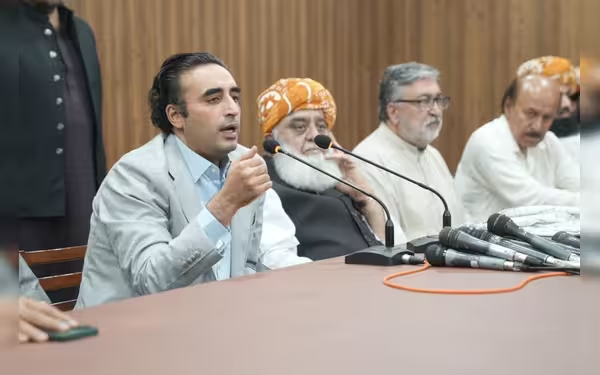Saturday, November 16, 2024 10:50 PM
PPP and JUI-F Finalize 26th Amendment Draft
- PPP and JUI-F reach agreement on 26th amendment.
- Bilawal Bhutto Zardari emphasizes electoral reforms.
- Maulana Fazlur Rehman to meet PTI leaders for consensus.
 Image Credits: tribune.com.pk
Image Credits: tribune.com.pkPPP and JUI-F have agreed on the 26th amendment draft, aiming for electoral reforms and political collaboration in Pakistan.
In a significant political development, the Pakistan Peoples Party (PPP) and the Jamiat Ulema-e-Islam (F) have reached an agreement on the draft of the 26th amendment. This amendment is expected to play a crucial role in shaping the future political landscape of Pakistan. The discussions surrounding this amendment have been ongoing, reflecting the dynamic nature of the country's political environment.
During a press conference held in Karachi on October 15, 2024, PPP Chairman Bilawal Bhutto Zardari and JUI-F Chief Maulana Fazlur Rehman shared their insights on the proposed changes. They emphasized the importance of collaboration among political parties to ensure a stable and progressive governance structure. Bilawal Bhutto Zardari highlighted that the amendment aims to address various pressing issues faced by the nation, including electoral reforms and governance challenges.
Maulana Fazlur Rehman, while addressing the media, mentioned that he would be meeting with leaders from the Pakistan Tehreek-e-Insaf (PTI) in Islamabad on the following day. This meeting is anticipated to further discuss the proposed amendments and seek broader consensus among political factions. The collaboration between PPP and JUI-F signifies a potential shift in alliances, which could have far-reaching implications for the political dynamics in Pakistan.
The 26th amendment is not just a legal document; it represents the aspirations of the people for a more accountable and transparent government. As political parties come together to discuss these changes, it is essential for citizens to stay informed and engaged. Understanding the implications of such amendments can empower voters and encourage active participation in the democratic process.
The agreement on the 26th amendment between PPP and JUI-F marks a pivotal moment in Pakistan's political journey. As discussions continue, it is crucial for all stakeholders to prioritize the interests of the nation and work towards a unified approach that fosters stability and growth. The future of Pakistan's governance may very well depend on the outcomes of these negotiations, making it imperative for citizens to remain vigilant and informed.













